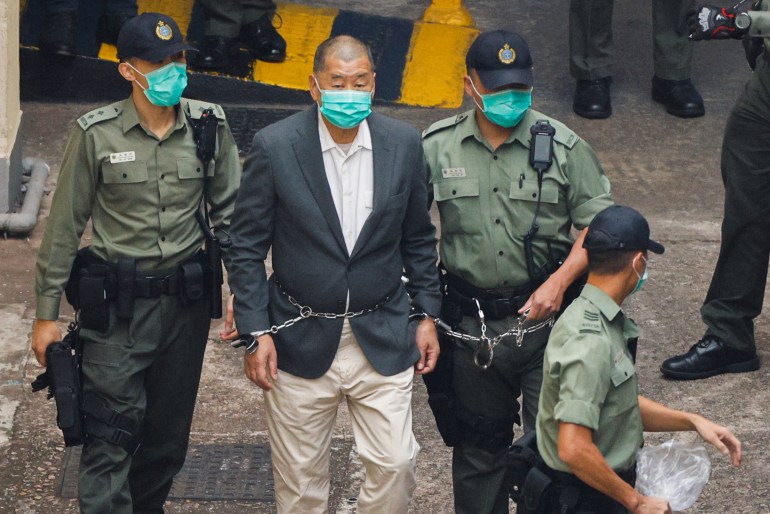Hong Kong police detain 11 for allegedly helping activists escape
Latest arrests are related to a group picked up by the Chinese coastguard as they fled in a speedboat, and now jailed on the mainland.

Police in Hong Kong arrested 11 people under the territory’s national security law on Thursday morning for allegedly helping 12 activists who attempted to escape the city by speedboat and were last month tried and jailed in mainland China.
Local media said eight men and three women – the youngest aged 18 and the oldest 72 – were detained in a series of raids that began at dawn. One of them was a secondary school student, according to local broadcaster TVB.
Keep reading
list of 4 items‘Purgatory of the Orient’: World reacts to Hong Kong mass arrests
Dozens arrested in sweeping Hong Kong crackdown
Hong Kong tycoon Jimmy Lai ordered back to jail pending trial
District Councillor Daniel Wong, who is also a lawyer, was also among those detained, according to his Facebook account. He has long provided legal assistance to pro-democracy activists including people who took part in the 2019 protests.
There was no official confirmation of the raids from the police.
The group was suspected of “assisting offenders”, the South China Morning Post newspaper reported, citing an unnamed police source.
“We hope the world is watching and likeminded democracies are ready to act in response to the increasing deterioration of human rights, freedom and the rule of law in Hong Kong,” Hong Kong Watch, a UK-based group that campaigns in support of Hong Kong’s freedoms, wrote on Twitter, describing reports of the detentions as “disturbing”.
Daniel Wong Kwok-tung chanting “Persists in Democracy, Rule of Law, Human Rights, #HongKongerdon‘t give up!” when escorted out from district councillor office after arrest for alleged assiting #12hkyouths to flee Taiwan (Video via @RTHK_HK)https://t.co/3sdjTeRqbg pic.twitter.com/xiburwKZ8j
— Galileo Cheng (@galileocheng) January 14, 2021
The group that tried to leave the territory by boat – including two teenagers – were picked up by the Chinese coastguard in August and held in jail – unable to meet family or their own lawyers – until their trial in Shenzhen on December 28. Two days later the court jailed 10 of the activists for between seven months and three years, while the two who were under-18 were transferred to Hong Kong police custody.
Thursday’s arrests are part of a continuing crackdown on Hong Kong’s pro-democracy movement that has included elected politicians, as well as activists and lawyers. Media tycoon Jimmy Lai is one of the most prominent people facing charges under the national security legislation.
Just last week, 50 people, including a US citizen, were detained under the law for their part in organising a primary election to choose democratic candidates for the later postponed Legislative Council elections. The group was accused of “subversion”.
Beijing imposed the security legislation – approved in record time and with no oversight from Hong Kong – on June 30 last year in a move it said was necessary to deal with “separatism” and “foreign interference” after months of sometimes violent protests in 2019.
The law punishes crimes of secession, sedition and collusion with foreign forces with terms of up to life in prison.

The details of the legislation were not revealed until after it was passed, and critics warned it could be used to criminalise dissent in a territory that was guaranteed political and civil freedoms unknown on the mainland when it was returned to Chinese rule by the British in 1997.
Cases head to court
The protests had already dwindled at the time the law was enacted, helped by bans on mass gatherings as a result of the coronavirus pandemic. Numerous protesters are now being brought to court over charges including “illegal assembly” and “rioting”.
British media reported on Wednesday that there was concern within the UK government and among members of the ruling Conservative party that David Perry, a senior British QC, had agreed to a Hong Kong government request to prosecute a high-profile protest case involving nine defendants including 73-year-old Lai, and veteran democrat Martin Lee.
The justice department said the “complexity” of the case and its “real and significant impact on the exercise of the freedom of assembly in the future” warranted Perry’s involvement, according to the South China Morning Post.
Really disgraceful this. Where are the ethics of the English legal profession going? https://t.co/gRk1hvfrn7
— Andrew Adonis (@Andrew_Adonis) January 13, 2021
Perry has worked on a number of high profile cases in Hong Kong including the trial of former chief executive Donald Tsang for misconduct in public office and bribery.
“We all need to ask when the law stops being an instrument of justice and becomes the tool of tyrants,” Tom Tugendhat, chairman of the foreign affairs committee, was quoted as saying by the Times newspaper. “Hong Kong’s new security law suggests we’re beyond the point when we can ignore the question and the implications for everyone working in the legal process.”
Perry, who is attached to 6KBW College Hill in London, did not immediately reply to an emailed request for comment.
The UK government said last year that it was in discussions on whether it was appropriate for British judges to continue to sit on Hong Kong’s top court following the imposition of the national security law and the disqualification of elected legislators.
Hong Kong was a British colony for more than 150 years before its return to China.
At the handover it was agreed two top judges from the UK would sit on the Hong Kong Court of Final Appeal, in order the show Britain’s continuing commitment to safeguarding the rule of law in the territory. The court also includes retired judges from the UK and from other common law jurisdictions, including Australia and Canada.